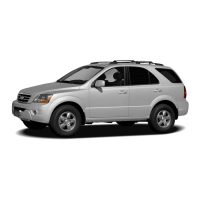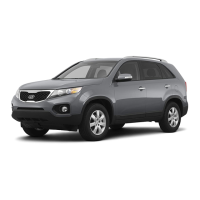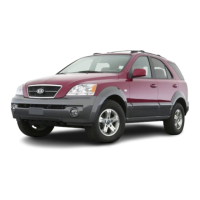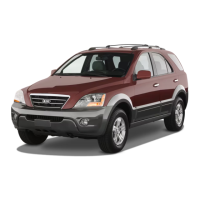51
4
4
Features of your vehicle Fuel filler door
䳜 Do not use mobile phones whilst
refuelling. Electric current and/or
electronic interference from
mobile phones can potentially
ignite fuel vapours and cause a
fire.
䳜 Do not get back into a vehicle
once you have begun refuelling.
You can generate a build-up of
static electricity by touching, rub
-
bing or sliding against any item or
fabric capable of producing static
electricity. Static electricity dis
-
charge can ignite fuel vapours
causing a fire. If you must re-
enter the vehicle, you should once
again eliminate potentially dan
-
gerous static electricity discharge
by touching a metal part of the
vehicle, away from the fuel filler
neck, nozzle or other petrol
source, with your bare hand.
䳜 When refuelling, always shift the
gear to the P (Park) position, set
the parking brake, and place the
ignition switch or ENGINE START/
STOP button to the LOCK/OFF
position.
䳜 Sparks produced by electrical
components related to the engine
can ignite fuel vapours causing a
fire.
䳜 When using an approved portable
fuel container, be sure to place
the container on the ground prior
to refuelling. Static electricity dis
-
charge from the container can
ignite fuel vapours causing a fire.
Once refuelling has begun, contact
between your bare hand and the
vehicle should be maintained until
the filling is complete.
䳜 Use only approved portable plastic
fuel containers designed to carry
and store petrol.
䳜 Do not use matches or a lighter
and do not smoke or leave a lit
cigarette in your vehicle whilst at
a gas station, especially during
refuelling.
䳜 Do not over-fill or top-off your
vehicle tank, which can cause
petrol spillage.
䳜 If a fire breaks out during
refuelling, leave the vicinity of the
vehicle, and immediately contact
the manager of the gas station
and then contact the local fire
department. Follow any safety
instructions they provide.
䳜 If pressurised fuel sprays out, it
can cover your clothes or skin and
thus subject you to the risk of fire
and burns. Always remove the
fuel cap carefully and slowly. If
the cap is venting fuel or if you
hear a hissing sound, wait until
the condition stops before com
-
pletely removing the cap.
䳜 Always check that the fuel cap is
installed securely to prevent fuel
spillage in the event of an acci
-
dent.

